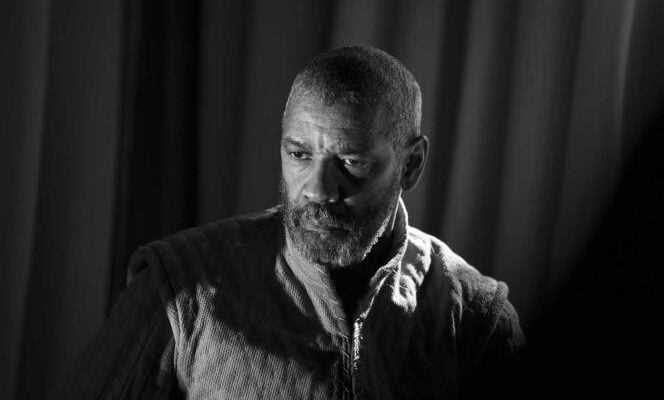Thirty-seven years ago Blood Simple, the first film by Joel and Ethan Coen, depicted star-crossed lovers, whose trajectory was guided by this precept: “Blood will have blood” (“blood wants blood”, Macbeth, act III, scene 4). In the company of his wife, Frances McDormand, met on the set of Blood Simple, Joel Coen went back to the source of this maxim: Macbeth’s Tragedy (full title of the play, first performed in 1611), by William Shakespeare. Frances McDormand is Lady Macbeth, and Denzel Washington, the regicide turned tyrant. Joel Coen, who, for the first time, is the only master on board, embraces Shakespeare’s text, tears it apart and – above all – stages it to plunge a little deeper into the heart of darkness.
The beauty of the “Scottish play” (British theatrical tradition dictates that, to keep the curse it bears at a distance, the work is designated by this periphrasis) lies in its attention entirely devoted to the evil that the humans. The character of Macbeth embodies it and tells it. Once committed the first crime, he advances in horror and villainy, without ever losing the measure of his actions. It is he who chronicles his descent to abjection, with a poetic power that commands admiration, prevents repulsion.
Terrible Shard
From the purulent and feverish mind of Macbeth, Joel Coen conjures up a geometric hallucination. In the old framework of films before the wide screen, in black and white (the image is by Bruno Delbonnel), the tragedy is based on centuries of history, that of the theater and that of the cinema. Stefan Dechant’s stylized sets borrow both from German expressionism and speculative science-fiction motifs, the setting sometimes evoking Soviet cinema.
The text has been cut to the bone, stopping just before the mutilation, allowing itself some liberties with the original
The text has been cut to the bone, stopping just before the mutilation, allowing itself some liberties with the original (the courtier Ross becomes a pivot of the dramaturgy). Coen – who carried out the operation himself – did not want to modernize the language of Shakespeare, leaving it to his interpreters to make it heard in the ears of the 21st century.and century. They are the ones who give this constantly renewed enterprise its terrible brilliance. We thus saw, in 2015, Michael Fassbender and Marion Cotillard in the adaptation of Justin Kurzel, and the versions of Orson Welles, in 1948, of Roman Polanski, in 1971, are each crucial moments in the career of their director.
You have 47.47% of this article left to read. The following is for subscribers only.
